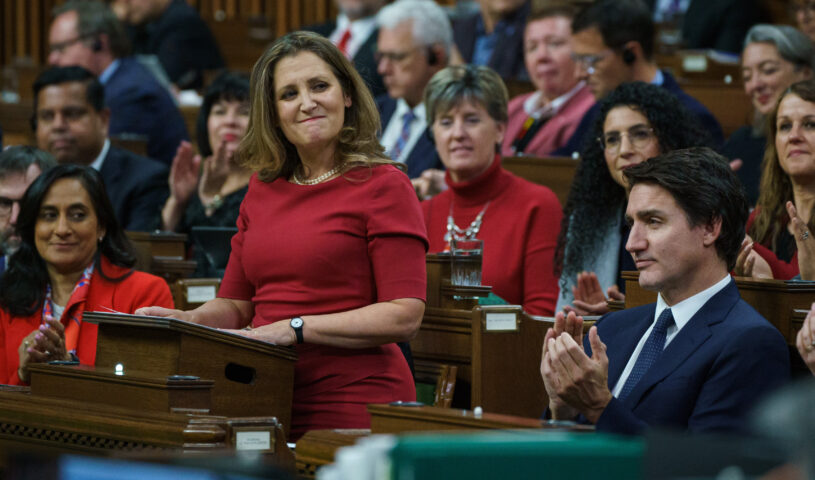Housing the top issue for municipalities in fall economic statement
 Deputy Prime Minister and Minister of Finance Chrystia Freeland announced billions of dollars in new spending on housing in the federal government’s Fall Economic Statement. Photo: Chrystia Freeland X (formerly Twitter) page
Deputy Prime Minister and Minister of Finance Chrystia Freeland announced billions of dollars in new spending on housing in the federal government’s Fall Economic Statement. Photo: Chrystia Freeland X (formerly Twitter) page
Billions of dollars in new spending on housing is the top item of interest for municipal leaders coming out of the federal government’s Fall Economic Statement (FES).
The economic statement, delivered in the House of Commons Tuesday by Chrystia Freeland, Deputy Prime Minister and Minister of Finance, is meant as a mid-fiscal-year update on the government’s spring budget but also puts forward new spending items that need to be confirmed later with legislation.
“With a focus on supporting the middle class and building more homes, faster, we are taking action on the priorities that matter most to Canadians today,” Freeland said in the House of Commons.
Cap on the Federal Deficit
Freeland announced a new cap on the federal fiscal deficit, fixing it at no more that one per cent of Gross Domestic Product (GDP), which in effect means $32 billion when it takes effect in the 2026-27 fiscal year. The purpose of this is to send a message to the financial sector that, in an environment of high interest rates and a sluggish economy, the government wants to keep a lid on spending.
But in the meantime, Freeland announced increased spending. The updated deficit for the current year is now pegged at $40 billion and next year’s projected deficit is $38.4 billion, an increase of $3.4 billion from the government’s previous projection.
With the government under pressure due to public concern about inflation, interest rates and the cost of housing, a large part of this new spending is on housing, amounting to $20.8 billion.
Freeland announced $15 billion to go toward loan funding, beginning in the 2025-26 fiscal year, to build more than 30,000 homes across Canada. She also announced a new $1-billion affordable housing fund to be spent over three years, beginning in 2025-26, which is intended to build 7,000 new affordable homes. In addition, $309 million in spending was announced for a new co-operative housing development program to be launched in early 2024.
Other measures include expanding the recently announced measure to remove GST charges off rental developments to include co-op rental housing, as well as cracking down on short-term rentals. Freeland said the government plans to deny tax deductions for expenses incurred by short-term rental operators located in communities that prohibit their operations or are not compliant with local rules.
Department of Housing Announced
Freeland also announced the government will establish a reconstituted Department of Housing, Infrastructure and Communities, which is currently known as Infrastructure Canada. Clarification of the department’s powers, duties, and functions will be set out in upcoming legislation, but what it effectively means is that the federal is no longer content with ceding housing to provincial governments and instead will take the lead for improving housing outcomes and enhancing public infrastructure.
Affordability issues also dominated the economic statement. With many homeowners facing mortgage renewals with increased interest rates, Freeland said the government will introduce a Canadian Mortgage Charter that will set expectations for how lenders interact with homeowners throughout the mortgage process.
One of the proposals would see homeowners with an insured mortgage up for renewal not have to requalify at the minimum qualifying rate, sometimes referred to as a stress test, if they’re switching lenders at the end of their term.
“Our goal is to help Canadians through an incredibly challenging time by making sure Canadians have the support they need to afford their homes when renewing at a time of higher interest rates,” Freeland said in the House of Commons.
Also on the theme of affordability, Freeland said the government plans to invoke the “Right to Repair” for consumers by preventing manufacturers of goods from refusing to service and repair devices and products in an “anti-competitive” manner.
FCM President Weights In
Scott Pearce, president of the Federation of Canadian Municipalities (FCM), said the new spending on housing was welcome but his concern is that the economic statement does not reflect the scale of infrastructure investment required to meet the national housing supply gap.
“The reality is that we cannot rapidly scale up new housing construction without also investing in the municipal infrastructure that supports it,” Pearce said in a statement.
“FCM will be looking to Budget 2024 for a comprehensive, ambitious investment in in community infrastructure that matches the record-breaking population growth currently underway in Canada.”
The opposition parties were united in panning the statement. Conservative Leader Pierre Poilievre said there is a “looming mortgage crisis” and the fall economic statement does not do enough to build more homes. NDP Leader Jagmeet Singh took credit for the government’s emphasis on housing while at the same time saying more work needs to be done regarding affordability. Bloc Québécois Leader Yves-François Blanchet said the more than $20 billion in housing spending amounted to “crumbs” and predicted a recession is coming soon. Green Party Leader Elizabeth May said the government in its economic statement is prioritizing large corporations and their profits over ordinary people and small businesses. MW
✯Municipal World Executive and Essentials Plus Members: You might also be interested in Greg Crone’s article: Fiscal new deal for municipalities inches forward
Greg Crone is Executive Editor of Municipal World.
Related resource materials:



